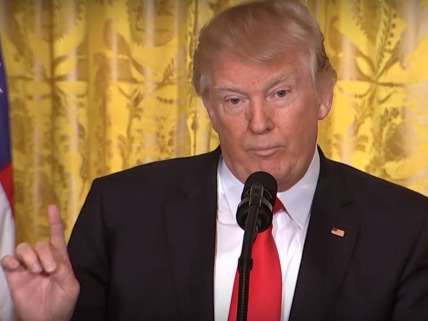Reacting to London Attack, Trump Says Travel Ban Is Tough and Smart. He's Half Right.
The president's counterterrorism policy confuses political incorrectness with seriousness.

Reacting to the terrorist attack in London on Saturday night, Donald Trump tweeted that "we need to be smart, vigilant and tough," "stop being politically correct," and "get down to the business of security for our people." But the only concrete policy he mentioned was his temporary ban on visitors from six Muslim-majority countries, which is unlikely to make the already tiny risk of dying in a terrorist attack any smaller.
"We need the courts to give us back our rights," the president said on Saturday, meaning he wants the Supreme Court to lift the preliminary injunction against his executive order. "We need the Travel Ban as an extra level of safety!"
We need to be smart, vigilant and tough. We need the courts to give us back our rights. We need the Travel Ban as an extra level of safety!
— Donald J. Trump (@realDonaldTrump) June 3, 2017
If that is Trump's aim, the focus of his travel ban is rather puzzling. The executive order covers six countries (down from seven in the original version): Iran, Libya, Somalia, Sudan, Syria, and Yemen. Since 1975 no one in the United States has died in an attack by a terrorist from any of those countries, although there have been less serious incidents, including two nonfatal knife attacks last year by people with Somali backgrounds, both of whom were killed in the midst of their assaults. From 1975 through 2015, according to a count by Cato Institute immigration analyst Alex Nowrasteh, six Iranians, six Sudanese, two Somalis, and one Yemini were "convicted of attempting or carrying out terrorist attacks on U.S. soil."
Continuing the administration's pattern of ignoring relevant evidence, Trump's order mentions just one of those cases, involving "a native of Somalia who had been brought to the United States as a child refugee and later became a naturalized United States citizen." As the U.S. Court of Appeals for the 4th Circuit noted when it upheld the injunction against the travel ban, the order "does not include any examples of individuals from Iran, Libya, Sudan, Syria, or Yemen committing terrorism-related offenses in the United States." But according to Nowrasteh, there are at least 13 such cases involving people from Iran, Sudan, and Yemen.
Even if Trump had included all the relevant examples, the case for targeting these six countries would be weak, since citizens of other countries account for a much larger share of terrorist plots, attacks, and casualties in the United States. From 1975 through 2015, Nowrasteh found, 19 foreign-born terrorists came from Saudi Arabia, 14 came from Pakistan, 11 came from Egypt, and 11 more came from Cuba. Their combined death toll was 2,537. During the same period, six foreign-born terrorists came from Iran, six from Sudan, two from Somalia, and one from Yemen. Zero came from Libya or Syria. The combined death toll for terrorists from those six countries was zero.
Nor is it clear how Trump's plan, which calls for the development of improved vetting procedures during the three months when citizens of the six countries would be forbidden to enter the United States, can reasonably be expected to catch the tiny percentage prone to terrorism. As an internal Department of Homeland Security report prepared last March notes, "most foreign-born, US-based violent extremists likely radicalized several years after their entry to the United States, limiting the ability of screening and vetting officials to prevent their entry because of national security concerns." In the one relevant case cited by Trump's executive order, for instance, better vetting would have made no difference, since the offender entered the country as a child.
In a declaration cited by the 4th Circuit, 10 former national security, foreign policy, and intelligence officials (mostly from Democratic administrations) said "there is no national security purpose for a total bar on entry for aliens" from the seven countries named in the original travel ban (the current six plus Iraq). "Since September 11, 2001," they said, "not a single terrorist attack in the United States has been perpetrated by aliens from the countries named in the Order." As noted above, that is not quite accurate. But it is fair to say that Trump's selection of countries seems arbitrary given the backgrounds of terrorists who have carried out attacks in the United States, very few of whom came from any of those countries.
The same is true if you look at people convicted in connection with planned domestic attacks that never came to fruition. Nowrasteh identified four such cases involving people from the targeted countries (two from Iran and two from Somalia) since 9/11.
Trump's travel ban may indeed be tough (at least as far as its impact on foreign nationals and their American relatives goes), and it may be politically incorrect. It may even be (and probably is) constitutional. But that does not make it smart.
Addendum: In a follow-up tweet this morning, Trump says, "The Justice Dept. should have stayed with the original Travel Ban, not the watered down, politically correct version they submitted to S.C." That remark is weird for a couple of reasons: 1) It was Trump, not the Justice Department, who ultimately decided to issue a revised executive order rather than continue to defend the original version, and 2) excluding lawful permanent residents and current visa holders from the ban made the order harder to challenge.
Trump compounds the weirdness in a subsequent tweet: "The Justice Dept. should ask for an expedited hearing of the watered down Travel Ban before the Supreme Court - & seek much tougher version!" Reverting to the original order after successfully defending the revised one would only prolong the legal battle, and here again Trump makes it seem as if he is not really in charge of his own administration, that the Justice Department decides which executive orders to issue.


Show Comments (76)